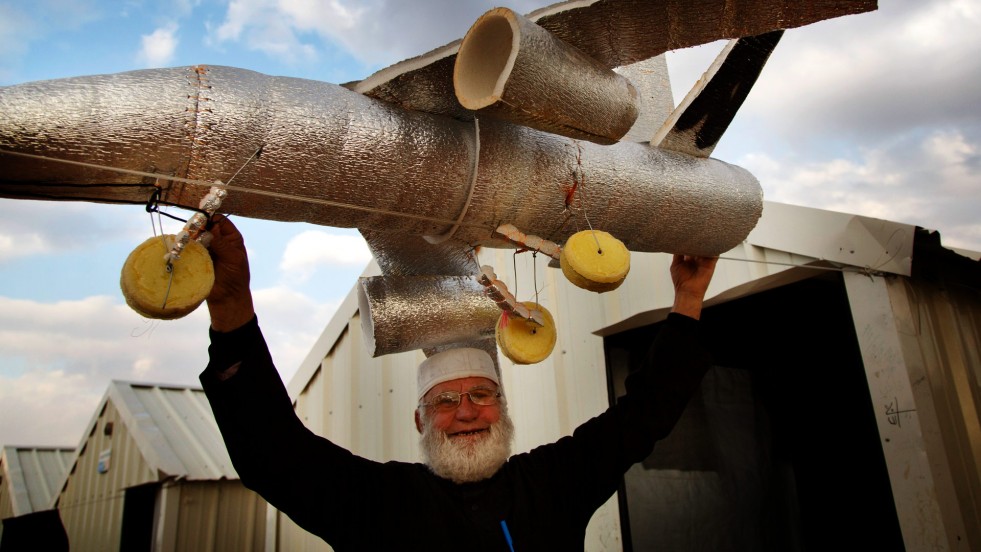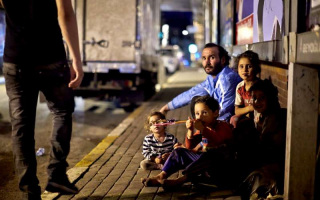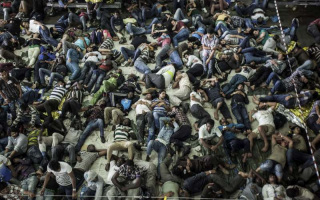The barren, rock-strewn expanse of Jordan’s northern desert looks like it could be the backdrop for a science fiction movie. The only comfort this featureless, Martian landscape offers to the more than 15,000 Syrians who now call this place home is an escape from the violence back home.
Four years since the start of the conflict, some 625,000 Syrian refugees have fled for their lives to neighbouring Jordan, caught up in the worst humanitarian crisis of our time. Azraq refugee camp was opened last year to help cope with the influx. The sturdy, metal shelters stretching across the desert in countless rows have been built to last – a symbol of a crisis with no end in sight.
Marooned indefinitely in this desolate wasteland, it would be easy for these refugees who have lost everything to give up hope. But despite the horrors they have seen and the hardships they now face, I meet people striving to improve their lives with the only tools available to them: their knowledge and determination.
The three individuals profiled here embody the resilience and creativity of Syria’s exiled millions. They are using their ingenuity to make life better for themselves and those around them. They are the inventors of Azraq.
The Toymaker
For more than three years, 65-year-old Kareem and his family tried to ride out the conflict in their village near Homs. Despite never finishing high school, he worked hard building up a successful construction firm, and made a good life for himself and his 14 children. They owned comfortable homes, a large farm and several shops.
But after armed men came to his house and threatened to kill his family unless he handed over his savings, Kareem took the gut-wrenching decision to leave everything behind and become a refugee. “I left Syria for my children because I was afraid that they would come back and kill us all,” he tells me.
He describes the shock he felt when the family first arrived at the camp and saw the white metal shelters where they would have to live. “We looked at the ground and it was all dirt. We looked at the shelter, and we asked ourselves: ‘What is this? This is something that we used to put our animals in.’ ”
With no work and little to do but eat and sleep, life in the camp was tedious at first. To pass the time, Kareem constructed a large model airplane for his grandchildren using the only materials he could find – sheets of foam insulation, some wire and string.
I ask what made him choose to build a plane. “I used to travel a lot for work, to Saudi Arabia, Bahrain, Dubai. I loved travelling on planes. But the last image of planes for us is when they came to bomb us, so I made this to remember the planes I used to love.”
“When I see my grandchildren playing with the things I make, I become very happy. My stress goes away.”
Kareem has built other toys for the kids, and used his construction skills to make improvements to the family’s home. Japanese-style dividing walls inside the shelter offer warmth and privacy, and their few possessions are neatly organised in cardboard cupboards and hanging pouches fixed to the walls.
He even built an evaporative refrigerator outside their shelter using sand, rocks and a length of hose. “It kept the food inside really cold, but some children from the camp didn’t know what it was and took it apart,” he laments. His face, framed by his snowy white hair and beard, looks briefly stern before cracking into a wide, mischievous grin. With 18 of his grandchildren living with him in the camp, he knows all about the curiosity of youth.
He longs to return to his farm in Syria, and the simple pleasures he left behind. When I ask him what he misses most, he recalls starting each day with a spoonful of honey from the farm’s beehives, or eating the sweet, dark grapes that grew on the vines. “When we left, the grapes were just starting to get ripe,” he says, full of regret.
Despite his sense of loss, Kareem’s relentless optimism and good humour are reflected on the smiling faces of his grandchildren, who run around his feet playing with another of his creations, a large toy car. Their pleasure, he says, is its own reward. “There’s nothing more precious than the child of your child. When I see my grandchildren playing with the things I make, I become very happy. My stress goes away.”
Refugee Remedies
When I enter 60-year-old Hassna’s shelter for the first time, I’m enveloped in wonderful aromas. In the rear of her small living area I find an Aladdin’s cave of fragrant herbs and seeds, all neatly bagged and arranged in plastic bowls.
Originally from Syria’s southern Dera’a governorate, as a qualified botanist she spent 33 years studying the medicinal properties of plants for various research centres. As part of her work she travelled the world attending scientific conferences, and oversaw seed banks and nursery gardens full of rare and useful plant varieties.
She and her husband, Farouk, had homes in Dera’a and Damascus. Two years ago, he travelled to the capital while she remained in Dera’a, intending to follow him shortly afterwards. She has not seen or spoken to him since. “After he left, the roads were blocked and the phones stopped working. My relatives have been told that he is still alive, but I don’t know any more than that.”
A year later, when fighting surrounded her village, she packed her things and made her way alone to the Jordanian border. I ask what she took with her when she fled. “The most important things. I didn’t take any clothes. I brought 15 books with me, about the study of medical plants, and I also brought my most beloved seeds.”
She shows me her qualifications and certificates earned during a lifetime of study and research, spreading them proudly around the floor of her shelter. While we chat, an elderly Syrian woman comes to the door complaining of chest pains.
“I brought 15 books with me, about the study of medical plants, and I also brought my most beloved seeds.”
Hassna asks a few questions before retreating to the rear of the shelter and rummaging around among the books and herbs. She emerges with a small brown bottle and gives the woman a spoonful of syrup that smells of honey and thyme, before seeing her out with a friendly admonishment to give up smoking.
When she returns, she explains how she was working as a volunteer in one of the camp’s community centres. There she met several women who said they and their children were suffering from eczema due to the hot, dry, desert climate.
“I’ve tried to help people with herbal remedies and by using my knowledge,” she says. Word of her treatments quickly spread within the camp, and she now receives several visits a day from people seeking her help.
Her eczema remedy is the most sought after, but she also uses her knowledge and some basic equipment to make skin creams, lip balm, facemasks, herbal teas and various syrups. Few residents of the camp have money to pay her, but sometimes they give her herbs or other useful ingredients by way of thanks.
She tells me she is happy to be able to help people, as it gives her life in the camp a sense of purpose. “When people come to me for help I don’t feel so useless. I want to be able to leave something behind – a footprint showing I was here.”
Hassna herself is a walking testament to the efficacy of her creams and lotions, looking at least a decade younger than her 60 years. The only lines on her face are those that appear around her eyes every time she smiles.
Her smile fades when she plays me a video sent to her by a neighbour of her home in Dera’a. It shows a tangle of smashed concrete riddled with bullet holes. Her tears, when they come, are not for the bricks and mortar, she says. “I can rebuild the house, but in my garden I planted seeds that I brought back from my travels, from India, Italy, France. I just pray that my plants are still waiting for me when I get home.”
The Mousetrap
It isn’t hard to find Jihad’s shelter among the thousands of identical structures in Azraq – just look for the one with the windmill. When he and his family arrived at the camp last June to find there was no electricity, the 52-year-old self-taught plumber and electrician took matters into his own hands.
Every family is issued a solar lantern when they arrive, but even in the desert solar power has its limitations. “Sometimes there is no sun, so we can’t charge the lamps. That means we would have to go to bed early. But there is wind, and wind is good.”
Using a dynamo he found at the local market, a wooden pole, some sheet metal and telephone wire, he built a wind generator that provides lighting for their shelter and communal toilet. As if that were not impressive enough, the only tools he had to work with were a pair of nail scissors and some pliers.
Originally from Homs, Jihad left the besieged city in 2012 and moved with his wife and four children to the relative safety of Damascus. He rented an apartment using savings he had accumulated working for an oil company in Algeria, but he was unable to find a job and their situation became untenable. “We stayed there for almost two years, but I spent everything I had saved in my life and we were forced to leave.”
Arriving in Azraq, they were initially taken aback by the desolation, but Jihad’s practical, problem-solving approach soon kicked in. “As long as we were safe I knew I could improve our situation. I just saw opportunities. My wife was a little more sceptical, though,” he adds with a wry smile.
“As long as we were safe I knew I could improve our situation. I just saw opportunities.”
Her trepidation wasn’t helped by the nocturnal arrival of mice in their shelter. She gave her husband an ultimatum: either they go or I do. He shows me the mousetrap he made using some wire and a tin can, which has so far sealed the fate of seven unlucky rodents. When his neighbours in the camp heard the story, they brought him more materials and commissioned their own.
Sitting in his shelter, I notice other ingenious creations. In the kitchen area is a plastic jerry can fixed to the wall with an empty glue stick used to create a simple water faucet. The snug-looking moccasins he wears indoors were stitched together using spare blankets, and there’s a matching jacket hanging on the wall.
Despite his quiet and self-effacing demeanour, Jihad exudes a calm confidence in his ability to look after his family despite their current situation. “As long as we have stability and safety, I know I can make a life for them. I’ve got no problem living here for the rest of my life.”
Before leaving, I ask what one thing he wishes he could have brought from home, half-expecting him to pick some useful tool in line with his practical nature. I couldn’t have been more wrong. “I wish I had my wedding photos and the photos of my kids,” he says. “The physical things don’t matter, it’s the memories that count.”
Written by: Charlie Dunmore





